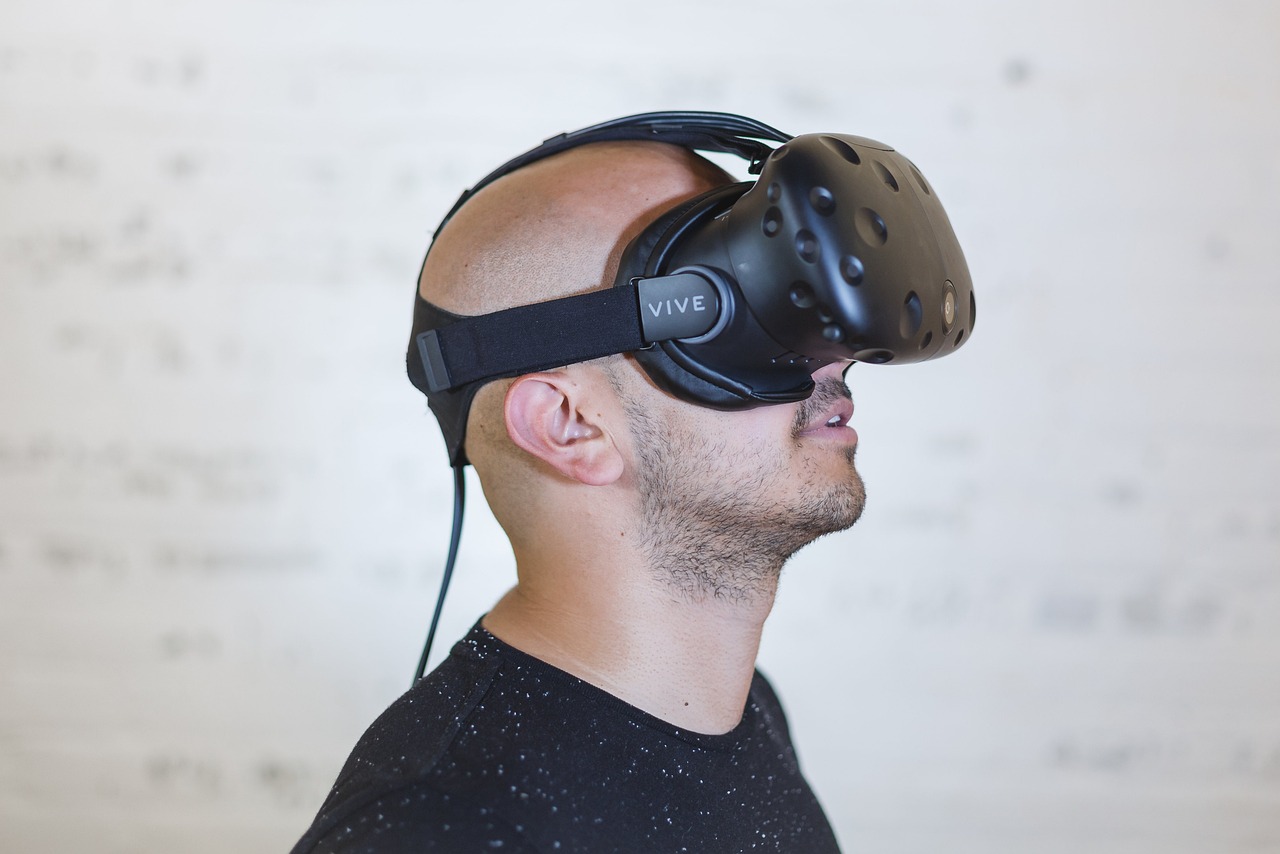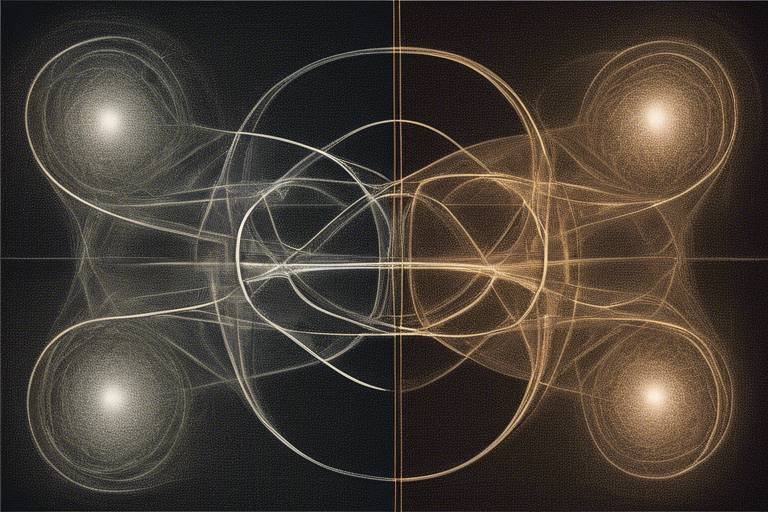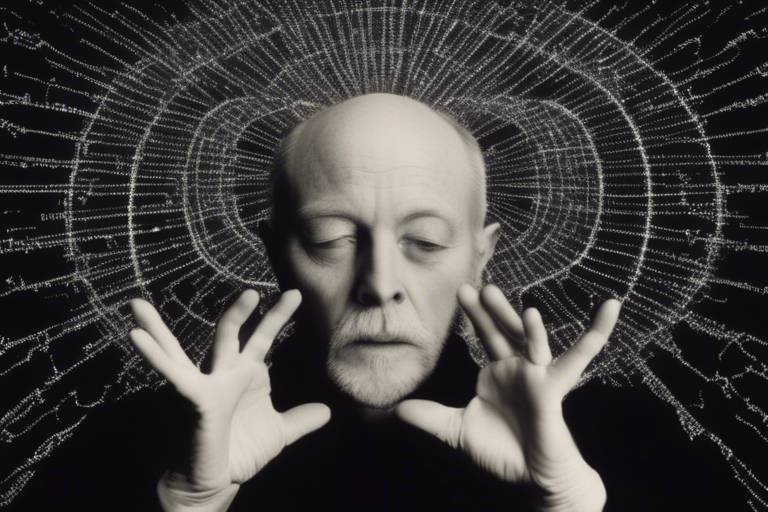Are Reality and Existence Abstract? A Metaphysical Interpretation
The questions of reality and existence have intrigued philosophers, scientists, and curious minds alike for centuries. Are these concepts merely abstract ideas floating in the realm of thought, or do they hold a tangible essence that shapes our lives? This article aims to delve into the intricate layers of these philosophical concepts, exploring their implications in metaphysics, consciousness, and perception. By examining the nature of reality and existence, we can provoke thought and discussion about what it truly means to "be." Are we simply products of our perceptions, or is there an underlying reality that governs our existence? Let's embark on this intellectual journey together.
When we ponder the nature of reality, we often find ourselves entangled in a web of philosophical interpretations and theories. Reality is not just about the physical world we see around us; it encompasses the essence of our experiences, thoughts, and emotions. Philosophers like Plato posited that reality consists of ideal forms, while others, like Immanuel Kant, argued that our understanding of reality is filtered through our senses and perceptions. So, what constitutes reality? Is it the solid ground beneath our feet, or is it the fleeting thoughts that dance through our minds? As we explore various philosophical interpretations, we begin to understand that reality is a complex tapestry woven from both tangible and intangible threads.
The dichotomy between existence and non-existence presents a fascinating philosophical puzzle. At its core, existence refers to the state of being, while non-existence embodies the absence of that state. This interplay between being and nothingness can significantly influence our understanding of life. Have you ever wondered how our perceptions of existence shape our reality? For instance, existentialists argue that existence precedes essence, meaning that we define our purpose through our choices and actions. Conversely, nihilists contend that existence lacks inherent meaning, leaving us to grapple with the void. This philosophical tug-of-war invites us to question our beliefs about what it means to exist.
Exploring the philosophical landscape reveals a rich tapestry of viewpoints regarding existence. Each framework contributes uniquely to the broader discourse on being:
- Existentialism: Focuses on individual experience and the subjective nature of existence.
- Nihilism: Asserts that life lacks inherent meaning, challenging our understanding of reality.
- Realism: Claims that reality exists independently of perception, raising questions about subjective experience.
Existentialism invites us to embrace our individual experiences and the choices that shape our lives. It emphasizes that existence is not merely a given; rather, it is a canvas upon which we paint our meanings. Imagine being an artist, where every brushstroke represents a decision that defines who you are. This perspective empowers individuals to seek personal meaning, even in a world that may seem chaotic and devoid of purpose.
Nihilism presents a stark contrast, asserting that life lacks inherent meaning. This viewpoint can be unsettling, as it challenges our deeply held beliefs about purpose and significance. However, it also opens the door to profound questions: If life is devoid of meaning, how do we navigate our existence? Understanding nihilism can lead to a liberating realization that we have the power to create our own meanings, even in a seemingly indifferent universe.
Realism posits that reality exists independently of our perceptions. Yet, this stance faces challenges when we consider the subjective nature of human experience. For instance, two individuals can witness the same event but interpret it entirely differently based on their backgrounds, emotions, and beliefs. This raises a compelling question: Can we ever truly know reality, or are we forever confined to our subjective interpretations? The interplay between realism and subjectivity invites us to reflect on the limitations of our understanding.
Perception plays a crucial role in shaping our understanding of reality and existence. Our senses act as the gateway through which we experience the world, but they can also be deceiving. Have you ever seen an optical illusion that tricks your mind? This phenomenon highlights how our perceptions can distort reality, leading us to question the authenticity of our experiences. Can what we perceive truly be considered real, or is it merely a projection of our minds?
The distinction between subjective and objective reality is essential in this discussion. Subjective reality is shaped by individual experiences, emotions, and interpretations, while objective reality exists independently of our perceptions. Understanding this difference can help us navigate the complexities of existence. For instance, while one person may find solace in nature, another may feel isolated and disconnected. These differing perceptions illustrate how our understanding of reality is deeply personal and varied.
The relationship between perception and consciousness is a fascinating area of exploration. Our awareness significantly influences how we interpret reality. Think of consciousness as a lens through which we view the world; it colors our experiences and shapes our understanding of existence. When we become more aware of our perceptions, we gain the ability to question and challenge our beliefs, leading to a richer understanding of reality.
Viewing reality and existence as abstract concepts carries profound metaphysical implications. It challenges us to reconsider our beliefs about ethics, identity, and knowledge. If reality is subjective, how do we define right and wrong in an abstract context? This exploration invites us to rethink our ethical frameworks and moral reasoning.
Metaphysical interpretations of reality can significantly influence ethical considerations. If reality is perceived differently by each individual, how can we establish a universal moral code? This question encourages us to engage in discussions about the nature of right and wrong, inviting diverse perspectives that enrich our understanding of morality.
Our concepts of reality and existence also shape our understanding of personal identity. How do we define ourselves in relation to the world around us? Our self-perception is intricately linked to our experiences and the realities we construct. This interplay between self and external reality invites us to explore the essence of who we are in a world that often feels abstract and elusive.
As we conclude this exploration of reality and existence, we are left with more questions than answers. The journey through these philosophical concepts reveals the complexity of our understanding and the myriad ways we can interpret our lives. In a world where reality and existence are seen as abstract constructs, the search for meaning becomes an ongoing quest. Each of us must navigate this landscape, seeking our truths and creating our realities.
- What is the difference between reality and existence?
Reality refers to the state of things as they actually exist, while existence pertains to the condition of being present or alive. - How does perception affect our understanding of reality?
Perception shapes our experiences and interpretations, influencing how we understand and interact with the world. - Can reality be objective?
While some argue that reality can exist independently of perception, our subjective experiences often complicate this notion.

The Nature of Reality
When we think about reality, what comes to mind? Is it the tangible world around us, or is it something much deeper, something that transcends our everyday experiences? The nature of reality has puzzled philosophers, scientists, and thinkers for centuries. At its core, reality can be understood as the sum of all that exists, but what does that really mean? Are our perceptions of reality merely reflections of our subjective experiences, or is there an objective reality that exists independent of our consciousness?
Various philosophical interpretations attempt to define the essence of reality. For instance, the materialist perspective posits that everything that exists is physical, and thus, reality is composed solely of matter and energy. On the other hand, idealism suggests that reality is fundamentally mental, asserting that the mind shapes the world around us. This dichotomy raises intriguing questions about the relationship between the observer and the observed. Are we simply passive recipients of sensory information, or do we actively construct our reality through the lens of our experiences?
To illustrate this complexity, consider the following table that outlines key philosophical interpretations of reality:
| Philosophy | Definition | Key Thinkers |
|---|---|---|
| Materialism | Reality consists only of physical matter. | Democritus, Karl Marx |
| Idealism | Reality is mentally constructed or immaterial. | Plato, George Berkeley |
| Realism | Reality exists independently of perception. | Aristotle, David Hume |
| Phenomenology | Reality is experienced through consciousness. | Edmund Husserl, Maurice Merleau-Ponty |
As we delve deeper, we encounter the concept of perception, which plays a pivotal role in shaping our understanding of reality. Are we seeing the world as it truly is, or are our senses deceiving us? This question leads us to consider the implications of subjectivity in our experiences. For example, two individuals may witness the same event yet interpret it in vastly different ways due to their unique backgrounds and perspectives. This subjectivity challenges the notion of a singular, objective reality.
Moreover, the exploration of reality often intersects with the realm of consciousness. What does it mean to be aware of our surroundings? How does consciousness influence our perception of reality? These inquiries highlight the intricate relationship between the mind and the world, suggesting that reality may not be a fixed entity but rather a dynamic interplay between our thoughts, feelings, and external stimuli. In essence, reality could be seen as a tapestry woven from the threads of individual experiences, perceptions, and interpretations.
In summary, the nature of reality is a complex and multifaceted concept that invites us to question our assumptions and beliefs. By examining various philosophical perspectives, we can begin to appreciate the richness of reality as not just a physical space, but as a profound interplay between the observer and the observed. This exploration not only enhances our understanding of reality but also encourages us to reflect on our own perceptions and the role they play in shaping our existence.

Existence vs. Non-Existence
The concepts of existence and non-existence create a fascinating dichotomy that has puzzled philosophers, scientists, and thinkers for centuries. At first glance, existence seems straightforward; we are here, we live, we breathe. Yet, when we dive deeper into what it truly means to exist, we uncover layers of complexity that challenge our understanding. What does it mean to exist? Is it merely about being present in a physical form, or is there more to it? On the flip side, non-existence raises even more profound questions. Can something truly not exist, or is it simply a concept we use to define the absence of being?
To grasp the relationship between these two notions, we must consider how they interact. Existence is often seen as a spectrum, where various forms of being can be categorized. For example, we might think of a tree as existing in a tangible way, while an idea exists in a more abstract sense. In contrast, non-existence can be viewed as a void, a lack of something that could potentially be. This leads us to ponder whether non-existence is merely the absence of existence or if it holds its own form of reality.
Philosophically, this dichotomy sparks debates that have led to various interpretations. Some argue that existence is a fundamental quality that defines reality, while others suggest that non-existence is equally significant, as it allows us to understand the limits of our reality. For instance, existentialists emphasize the importance of individual experience, suggesting that our personal realities shape our understanding of existence. Nihilists, however, might argue that non-existence proves that life lacks inherent meaning, which can be both liberating and daunting.
Moreover, the interplay between existence and non-existence can be illustrated through a simple table:
| Concept | Definition | Philosophical Implication |
|---|---|---|
| Existence | Being present in a tangible or abstract form | Shapes our understanding of reality and personal identity |
| Non-Existence | The absence of being or presence | Challenges the notion of reality and meaning |
Ultimately, the discussion of existence versus non-existence invites us to reflect on our own lives. Are we merely existing, or are we actively engaging with our existence? This question is not just philosophical; it has practical implications for how we live our lives. By recognizing the significance of both existence and non-existence, we can begin to appreciate the richness of our experiences and the depth of our consciousness.
As we navigate through these profound questions, we may find ourselves contemplating the very essence of what it means to be alive. In a world filled with uncertainties, the exploration of existence and non-existence becomes not just an intellectual exercise but a journey toward understanding our place in the universe.
- What is the difference between existence and non-existence?
Existence refers to the state of being present, while non-existence refers to the absence of being. - How do philosophers interpret existence?
Philosophers have various interpretations, including existentialism, nihilism, and realism, each offering unique insights into the nature of being. - Can non-existence be considered a form of reality?
This is a debated topic; some argue that non-existence helps define existence, while others see it as a mere concept without substance.

Philosophical Perspectives
The exploration of reality and existence has long been a playground for philosophers, each bringing their unique lens to the table. When we dive into the realm of philosophical perspectives, we discover a rich tapestry of ideas that challenge our understanding of what it means to exist. Think of it as a buffet of thoughts, where each philosopher offers a distinct dish. Some of the most influential schools of thought include existentialism, nihilism, and realism, each contributing unique flavors to the conversation about being and nothingness.
To start, let's unpack **existentialism**. This philosophy is all about the **individual experience** and the choices that shape our lives. Existentialists argue that existence precedes essence, meaning that we are not born with a predefined purpose; rather, we forge our own paths through conscious decisions. Imagine standing at a crossroads, with countless paths stretching before you. Each choice you make not only defines your journey but also adds layers to your existence. This perspective emphasizes the subjective nature of reality, suggesting that each person's experience is valid and significant in its own right.
On the flip side, we have **nihilism**, which offers a stark contrast. Nihilists assert that life lacks inherent meaning or value, leading to the conclusion that existence itself may be meaningless. Picture a vast, empty void where traditional values and beliefs dissolve. This can be a daunting realization, as it raises questions about the purpose of our actions and the significance of our experiences. However, nihilism also prompts a deeper inquiry into how we construct meaning in our lives, challenging us to create our own significance amidst the chaos.
Then, there’s **realism**, which posits that reality exists independently of our perceptions. Realists argue that there is an objective world out there, regardless of how we perceive it. Yet, this perspective faces challenges, particularly when we consider how subjective experiences can shape our understanding of that reality. It's like viewing a painting in a gallery: while the artwork exists independently on the wall, each viewer brings their own interpretation based on personal experiences and emotions. This interplay between perception and reality raises intriguing questions about the nature of truth and existence.
In summary, the philosophical perspectives on existence and reality serve as a foundation for deeper exploration. Each viewpoint—existentialism, nihilism, and realism—offers a unique lens through which we can examine our understanding of being. By engaging with these ideas, we not only enrich our own lives but also contribute to the ongoing dialogue about the essence of existence.
- What is existentialism? Existentialism is a philosophical movement that emphasizes individual experience and the freedom of choice, asserting that individuals create their own meaning in life.
- How does nihilism differ from existentialism? While existentialism focuses on creating meaning, nihilism argues that life is inherently meaningless, leading to questions about the purpose of existence.
- What is realism in philosophy? Realism is the belief that reality exists independently of our perceptions, suggesting an objective world that can be known, despite subjective interpretations.

Existentialism Explained
Existentialism is a philosophical movement that places individual experience and choice at the forefront of understanding existence. It argues that we, as individuals, are responsible for creating our own meaning in a world that often seems chaotic and devoid of inherent purpose. Imagine standing in a vast, empty landscape, where the only thing you can hear is the echo of your own thoughts. That’s the essence of existentialism: it’s all about the personal journey through life, where each choice shapes our reality.
At the heart of existentialism lies the belief that existence precedes essence. This means that rather than being born with a predetermined purpose, we are thrust into the world, and it is up to us to define who we are and what we stand for. Think of it like being handed a blank canvas; it’s your job to paint your own masterpiece, no matter how messy or unconventional it may turn out to be. This concept can be both liberating and daunting, as it places the weight of meaning directly on our shoulders.
Existentialist thinkers, such as Jean-Paul Sartre and Simone de Beauvoir, emphasized the importance of authenticity in our choices. They argued that to live authentically means to acknowledge our freedom and the responsibility that accompanies it. When we make choices based on societal expectations or fear of judgment, we relinquish our freedom and live in a state of bad faith, essentially lying to ourselves about our own desires and motivations. This struggle between authenticity and societal pressure creates a rich tapestry of human experience, where the quest for self-definition can lead to profound insights and personal growth.
Furthermore, existentialism acknowledges the absurdity of life. This refers to the conflict between our desire for meaning and the indifferent universe that often provides none. Imagine trying to find a clear path in a dense fog; you may stumble and fall, but each step taken is a part of your journey. This absurdity can lead to feelings of despair, yet it also offers an opportunity for liberation. By accepting the absurd, we can embrace our freedom and craft our own meaning, rather than waiting for external validation.
In summary, existentialism invites us to explore the depths of our own existence, urging us to confront our fears, embrace our freedom, and take responsibility for our choices. It’s a philosophy that resonates deeply, especially in a world where traditional structures of meaning are increasingly questioned. By understanding existentialism, we can begin to navigate our own paths through the complexities of life, transforming the chaos into a canvas of our own making.
As we delve deeper into the realm of existence, we may find ourselves asking: What does it mean to truly live? How do we define our essence in a world that often seems devoid of it? These questions not only challenge us but also enrich our understanding of what it means to exist.

Nihilism and Its Impact
Nihilism, at its core, is a philosophical doctrine that asserts the absence of inherent meaning or value in life. This perspective can be as unsettling as it is liberating. Imagine standing on the edge of an abyss, where everything you’ve ever believed about purpose and significance teeters on the brink of nothingness. For many, this can evoke feelings of despair or confusion, while for others, it opens the door to a radical form of freedom. If life lacks intrinsic meaning, then individuals are free to create their own meanings and values. But how does this viewpoint shape our understanding of reality and existence?
One of the most profound impacts of nihilism is its challenge to traditional moral frameworks. If we accept that life is devoid of inherent meaning, then the very foundations of ethics become questionable. This raises critical questions: Is morality merely a social construct? Can we hold onto ethical principles if there is no ultimate purpose to uphold them? In this sense, nihilism can lead to a sense of moral relativism, where right and wrong become subjective rather than universal truths.
Furthermore, nihilism influences our perception of existence itself. The idea that nothing matters can lead to existential crises, where individuals grapple with feelings of insignificance in the grand scheme of things. Yet, this same philosophy can also inspire a sense of empowerment. When one recognizes that the universe is indifferent, it can ignite a spark of creativity and authenticity, leading individuals to forge their own paths and meanings. It's like being handed a blank canvas; the absence of predefined patterns allows for the creation of something uniquely personal.
However, nihilism does not come without its challenges. The overwhelming nature of a world without meaning can lead to feelings of isolation and despair. Many who delve deep into nihilistic thought may find themselves questioning their relationships, goals, and even their identities. This paradox highlights the delicate balance between embracing freedom and confronting the void that nihilism presents.
In summary, nihilism profoundly impacts our understanding of reality and existence. It challenges us to confront uncomfortable truths about meaning and morality while simultaneously offering the opportunity to redefine our lives on our own terms. Whether viewed as a liberating force or a source of existential dread, nihilism invites deep reflection on what it means to be human in a world that may not inherently care.
- What is nihilism? Nihilism is a philosophical belief that life lacks inherent meaning, value, or purpose.
- How does nihilism affect morality? Nihilism challenges traditional moral frameworks, leading to questions about the nature of right and wrong.
- Can nihilism be empowering? Yes, while it can lead to feelings of despair, it can also inspire individuals to create their own meaning and values.
- What are the risks of nihilistic thinking? Nihilistic thinking can lead to existential crises, feelings of isolation, and a lack of direction in life.

Realism and Its Challenges
Realism, at its core, asserts that reality exists independently of our perceptions and beliefs. This philosophical stance posits that there is an objective world out there, one that doesn't rely on human consciousness for its existence. However, as straightforward as this notion may seem, it invites a plethora of challenges that compel us to question the very fabric of our understanding. For instance, how do we reconcile the existence of an objective reality with the subjective nature of human experience? This paradox is at the heart of many philosophical debates.
One of the primary challenges to realism is the concept of perceptual relativity. Our senses are inherently limited and can be deceived. Consider the classic example of optical illusions: what we see can be drastically different from what actually exists. This leads to the question: if our perceptions can mislead us, how can we trust our senses to provide an accurate representation of reality? This dilemma raises significant doubts about the claim that reality can exist independently of our perceptions.
Moreover, the advent of modern science has introduced another layer of complexity. Scientific discoveries, particularly in quantum mechanics, suggest that the act of observation can influence the behavior of particles. This phenomenon challenges the realist view by implying that reality is not merely a static entity but is influenced by our interactions with it. In this light, we might wonder whether reality is as concrete as realism suggests or if it is, in fact, a fluid construct shaped by consciousness.
To further illustrate the challenges faced by realism, let's consider a table that outlines some of the key criticisms:
| Challenge | Description |
|---|---|
| Perceptual Relativity | Our senses can be deceived, leading to questions about the accuracy of our perceptions. |
| Quantum Mechanics | The act of observation can alter the behavior of particles, suggesting reality is not fixed. |
| Subjectivity of Experience | Individual experiences can vary widely, raising doubts about a single, objective reality. |
In addition to these challenges, the subjective nature of human experience complicates the realist perspective. Each person perceives the world through a unique lens shaped by their thoughts, emotions, and cultural background. This subjectivity implies that our understanding of reality is not uniform; rather, it is a tapestry woven from diverse threads of individual experiences. Consequently, if reality is perceived differently by each person, can we truly claim that a singular, objective reality exists?
In summary, while realism offers a compelling framework for understanding existence, it is not without its challenges. The interplay between perception and reality raises profound questions about the nature of existence itself. As we navigate these philosophical waters, we must remain open to the complexities of our understanding and the potential for new insights that may reshape our views on reality.
- What is realism in philosophy? Realism is the belief that reality exists independently of our perceptions or beliefs.
- What are the main challenges to realism? Key challenges include perceptual relativity, insights from quantum mechanics, and the subjectivity of human experience.
- How does perception influence our understanding of reality? Perception can shape our experiences and interpretations, often leading to different understandings of what is real.
- Can there be a single objective reality? This is debated among philosophers, as subjective experiences suggest that reality may be more complex than a single objective truth.

The Role of Perception
When we dive into the concept of perception, it’s like peeling an onion—layer after layer reveals more complexity and nuance. Perception is not merely about what we see with our eyes or hear with our ears; it’s a deeply intricate process that shapes our understanding of reality and existence. Think about it: every moment we experience is filtered through our senses, colored by our emotions, past experiences, and even cultural backgrounds. This begs the question: can we ever truly grasp the essence of reality if our perception is inherently subjective?
To illustrate this point, consider two individuals standing side by side, witnessing the same sunset. One might be captivated by the vibrant hues and the serenity of the scene, while the other may feel a sense of sadness, recalling a lost relationship tied to that very moment. This divergence in experience underscores a crucial aspect of perception—it is not just about the external stimuli but also about our internal landscapes. Our minds interpret the world around us, and in doing so, they create a unique version of reality that may differ vastly from someone else's.
Moreover, the interplay between perception and consciousness is profound. Consciousness acts as a lens through which we view the world, influencing how we interpret sensory information. For example, when we are in a heightened emotional state, our perception can shift dramatically. A situation that seems trivial in a calm mindset can appear monumental when we are stressed or anxious. This highlights the fluidity of perception—it's not a static process but rather a dynamic one that evolves with our mental and emotional states.
In addition, the philosophical discourse around perception raises some intriguing questions. If reality is shaped by our perceptions, can we ever claim to know what is truly real? This leads us to consider the distinction between subjective and objective reality. Subjective reality is the personal interpretation of experiences, while objective reality refers to the world as it exists independently of our perceptions. The challenge lies in reconciling these two realms. Are they mutually exclusive, or can they coexist in a way that enriches our understanding of existence?
Ultimately, perception plays a pivotal role in how we navigate life. It influences our beliefs, shapes our relationships, and even drives our actions. Understanding this role can help us become more aware of our biases and assumptions, pushing us to question the validity of our perceptions. As we continue to explore the nature of reality and existence, we must remember that our perceptions are not just reflections of the world but are integral to the very fabric of our reality.
- What is the difference between subjective and objective reality? Subjective reality is based on personal experiences and interpretations, while objective reality exists independently of individual perceptions.
- How does perception influence our understanding of existence? Perception shapes our interpretation of experiences, which in turn affects how we comprehend the concept of existence.
- Can we trust our perceptions to reflect reality? While perceptions provide valuable insights, they are inherently subjective and can be influenced by various factors, including emotions and past experiences.

Subjective vs. Objective Reality
When we dive into the intriguing world of reality, we often stumble upon two distinct yet interconnected concepts: subjective reality and objective reality. But what do these terms really mean, and how do they shape our understanding of existence? Let’s break it down.
At its core, subjective reality refers to the personal experiences and interpretations that each individual has. It’s like wearing a pair of uniquely tinted glasses that color the way you perceive the world around you. Our emotions, memories, and sensory perceptions all contribute to this deeply personal lens. For instance, think about how two friends can visit the same concert and walk away with entirely different memories. One might remember the exhilarating energy of the crowd, while the other could focus on the discomfort of the loud noise. This divergence illustrates how subjective reality is influenced by individual perspectives and experiences.
On the flip side, we have objective reality, which is the idea that certain facts exist independently of our perceptions. This is the realm of measurable phenomena—things that can be observed and verified regardless of who is looking. For instance, the sun rises in the east and sets in the west, whether you’re there to witness it or not. Objective reality is often associated with scientific truths and universal laws. However, this doesn’t mean that our understanding of objective reality is infallible; it’s still subject to the limitations of human perception and interpretation.
To further illustrate the contrast between these two perspectives, consider the following table:
| Aspect | Subjective Reality | Objective Reality |
|---|---|---|
| Definition | Personal interpretation of experiences | Existence independent of perception |
| Influencing Factors | Emotions, memories, personal beliefs | Scientific evidence, observable facts |
| Example | Feeling happiness at a family gathering | The law of gravity affecting all objects |
Understanding the interplay between subjective and objective reality is crucial for grasping the complexities of human existence. Our subjective experiences shape our perception of the world, but they can also cloud our understanding of objective truths. This raises an important question: Can we ever truly know objective reality, or are we forever trapped in our subjective interpretations?
As we navigate through life, recognizing these two realities can help us appreciate the richness of human experience while also grounding us in the facts that govern our universe. By acknowledging both perspectives, we can foster a deeper understanding of ourselves and the world around us, bridging the gap between personal perception and universal truths.

Perception and Consciousness
When we talk about perception and consciousness, we’re diving into the deep waters of how we experience the world around us. Think about it: every moment of your life is filtered through your senses, and it’s your brain that interprets these signals. But what if I told you that this interpretation is not just a straightforward process? It’s more like a complex dance between our consciousness and the external world, where every step can change how we perceive reality.
At the heart of this discussion lies the question: What is real? Our consciousness plays a pivotal role in shaping our understanding of reality. When you see a red apple, your eyes transmit signals to your brain, but it’s your consciousness that labels it as “red” and “apple.” This process involves not just sensory input, but also memory, emotions, and prior knowledge. It’s like painting a picture with both vibrant colors and subtle shades, where every brushstroke influences the final masterpiece.
Moreover, perception is inherently subjective. Two people can look at the same apple, yet their experiences can be worlds apart. One might see it as a symbol of health and vitality, while another might remember a childhood experience of biting into a perfectly ripe fruit. This leads us to ponder whether there is an objective reality at all, or if we are merely living in our own constructed realities. To illustrate this, let’s consider a simple table:
| Aspect | Subjective Perception | Objective Reality |
|---|---|---|
| Color | May vary based on individual experience | Defined by light wavelengths |
| Meaning | Personal associations and emotions | Neutral and factual |
| Experience | Unique to each individual | Universal and consistent |
This table highlights the contrast between subjective perception and objective reality. It raises an important question: if our perceptions are so influenced by personal experiences, can we ever truly know the world as it is? Or are we forever trapped in our own interpretations?
Furthermore, the relationship between perception and consciousness extends into the realm of consciousness itself. Our awareness of our surroundings is not just passive; it’s an active engagement with the world. When we consciously focus on something, we filter out distractions and hone in on what we deem important. This selective attention can alter our perception dramatically. Have you ever been so engrossed in a book that you didn’t notice someone walking past you? That’s the power of consciousness at work, shaping your reality by narrowing your focus.
In conclusion, the interplay between perception and consciousness is a fascinating topic that challenges our understanding of reality. It invites us to question our assumptions and explore the nuances of human experience. Are we simply observers of a fixed reality, or are we co-creators, shaping our worlds through the lens of our consciousness? The answer may not be clear-cut, but the journey of exploration is what makes it all the more intriguing.

Metaphysical Implications
When we delve into the metaphysical implications of viewing reality and existence as abstract concepts, we are stepping into a realm that fundamentally challenges our understanding of the world. This exploration is not just an academic exercise; it has profound effects on how we perceive ethics, identity, and knowledge itself. Imagine for a moment that reality is like a vast ocean, and each philosophical interpretation is a different vessel navigating its waters. Depending on which vessel you choose, your journey—and the truths you uncover—can vary significantly.
To begin with, let's consider the impact on ethics. If reality is seen as an abstract construct, then the foundations of our moral reasoning can shift dramatically. Traditional ethical frameworks often rely on objective truths—universal laws that apply to all beings regardless of circumstance. However, when we entertain the idea that reality is subjective, we must question the very nature of right and wrong. Do morals become fluid, shaped by individual perceptions and experiences? This leads us to ponder whether ethical principles are inherent or socially constructed. For instance, the debate over moral relativism versus moral absolutism becomes even more critical in a world where existence is perceived differently by each individual.
Next, we turn our attention to identity and self. The interplay between our self-perception and the external world is a cornerstone of our understanding of who we are. If we accept that reality is abstract, we must confront the question: What does it mean to have a stable identity? In a world where perceptions can vary widely, our sense of self becomes a tapestry woven from countless threads of experience, belief, and interpretation. Each person’s identity could be viewed as a unique narrative, shaped by both internal thoughts and external influences. This leads us to consider how much of our identity is genuinely ours and how much is a reflection of the realities imposed upon us by society.
Moreover, the implications extend into the realm of knowledge. If reality is not an absolute, but rather a collection of subjective experiences, how do we ascertain what is true? Knowledge, in this context, becomes a slippery concept, often influenced by the lens through which we view the world. For example, scientific knowledge, which many consider objective, may be subject to reinterpretation based on new discoveries or shifting paradigms. This raises an important question: Can we ever truly know anything in a world where reality is constantly being redefined?
In summary, the metaphysical implications of viewing reality and existence as abstract concepts are vast and multifaceted. They challenge us to reconsider our ethical frameworks, our sense of identity, and the very nature of knowledge itself. As we navigate this complex landscape, we might find that the quest for meaning is not just about understanding what is real, but also about embracing the uncertainties that come with an abstract interpretation of existence.
- What are the main philosophical interpretations of reality? Various interpretations include realism, idealism, existentialism, and nihilism, each offering different insights into the nature of existence.
- How does perception influence our understanding of reality? Perception shapes our experiences and interpretations of reality, leading to subjective understandings that can differ greatly among individuals.
- Can ethics exist in an abstract reality? Yes, but ethical frameworks may become more fluid, relying on individual perspectives rather than universal truths.
- What role does identity play in metaphysical discussions? Identity is deeply intertwined with our perceptions of reality and existence, influencing how we understand ourselves and our place in the world.

Ethical Considerations
When we delve into the abstract nature of reality and existence, we inevitably stumble upon a myriad of . These concepts challenge us to rethink our moral frameworks and the foundations upon which we build our understanding of right and wrong. If reality is not a fixed entity but rather a fluid construct shaped by perception and individual experience, then how do we define our ethical obligations to one another?
One might argue that in a world where reality is subjective, the implications for ethics are profound. For instance, if two people perceive an event differently, how can we determine a single moral standpoint? This leads to an intriguing question: Is morality universal, or is it as subjective as our perceptions of reality? The answer may lie in the interplay between individual experiences and shared societal norms.
To illustrate this point, consider the following scenarios:
| Scenario | Perception A | Perception B |
|---|---|---|
| Helping a stranger | Acts of kindness are essential for a harmonious society. | Helping others is a waste of resources. |
| Environmental responsibility | Preserving nature is a moral duty. | Economic growth takes precedence over environmental concerns. |
In the table above, we see how two individuals can interpret the same situation in vastly different ways, leading to conflicting ethical conclusions. This highlights the necessity of dialogue and understanding in ethical discussions. How do we reconcile these differences? One approach is to foster a culture of empathy, where we strive to understand the perspectives of others, even when they diverge from our own.
Moreover, the abstract nature of existence raises questions about the responsibilities we hold towards ourselves and others. If we acknowledge that our perceptions shape our realities, then we also recognize the power of our choices. Each decision we make not only affects our own existence but also reverberates through the lives of those around us. In this sense, ethics becomes a shared journey, where we navigate the complexities of our interactions with both the tangible and intangible aspects of life.
Ultimately, the exploration of ethical considerations in relation to reality and existence invites us to reflect on the nature of our actions. It challenges us to ask ourselves: Are we living authentically, and are our choices aligned with our understanding of what is right? As we ponder these questions, we begin to see that ethics is not merely a set of rules but a dynamic conversation that evolves as we engage with the world around us.
- What is the significance of ethics in understanding reality?
Ethics helps us navigate our interactions and decisions within the subjective realities we each experience, providing a framework for moral reasoning. - Can ethics be universal if reality is subjective?
While individual perceptions of reality may vary, there can be shared ethical principles that guide collective behavior and societal norms. - How does perception influence our ethical decisions?
Our perceptions shape our understanding of situations, thus influencing how we evaluate moral dilemmas and make choices.

Identity and Self
When we dive into the concepts of identity and self, we find ourselves navigating a complex web of philosophical inquiry that challenges our understanding of who we are in relation to the world around us. Identity is not merely a label; it’s a tapestry woven from our experiences, beliefs, and perceptions. Think of it like a patchwork quilt, each piece representing a different aspect of our lives—our culture, our relationships, and our aspirations. But what happens when we peel back these layers? What do we find at the core of our being?
The exploration of identity raises profound questions: Is our identity fixed, or is it fluid? Are we defined by our actions, our thoughts, or perhaps by the perception others have of us? This interplay between self-perception and external reality is where things get particularly intriguing. For instance, consider the idea that our self-identity can shift based on different contexts—like how you might act differently at work compared to a casual gathering with friends. This duality makes us wonder, are we ever truly authentic, or are we simply reflections of our environments?
Moreover, the relationship between identity and existence is deeply intertwined. If we accept that reality is subjective, it follows that our understanding of self is also shaped by our unique perspectives. Our experiences color our identities, and in turn, our identities influence how we perceive reality. This cyclical relationship prompts us to ask: How does our identity shape our interactions with the world? And conversely, how does the world shape our identity?
To further illustrate this point, let's consider how identity can be categorized into different dimensions:
| Dimension | Description |
|---|---|
| Personal Identity | The unique characteristics and traits that define an individual. |
| Social Identity | The groups and communities we belong to, influencing our sense of self. |
| Cultural Identity | The shared values, traditions, and beliefs of a particular group. |
As we navigate these dimensions, we encounter the notion of self-awareness. This awareness is crucial in understanding our identity. It allows us to reflect on our choices and their implications. Are we living authentically, or are we conforming to societal expectations? The journey of self-discovery is not always straightforward; it can be filled with confusion and conflict. However, it is through this struggle that we often find clarity.
Ultimately, the exploration of identity and self is a profound journey that intertwines with our understanding of reality. As we question the nature of our existence, we must also confront the essence of who we are. Are we merely products of our environment, or do we possess the agency to define ourselves? This philosophical inquiry not only enriches our understanding of reality but also empowers us to take charge of our own narratives.
- What is the difference between identity and self? Identity refers to the characteristics and qualities that define us, while the self encompasses our awareness and understanding of who we are.
- Can identity change over time? Yes, identity can evolve based on experiences, relationships, and personal growth.
- How does culture influence identity? Culture shapes our beliefs, values, and behaviors, significantly impacting our sense of self.

Conclusion: The Search for Meaning
As we journey through the intricate landscape of reality and existence, we find ourselves grappling with profound questions that have baffled thinkers for centuries. The exploration of these concepts reveals that our understanding is not merely a reflection of the physical world around us, but rather a complex interplay of perception, consciousness, and philosophical interpretation. In this quest for meaning, we recognize that our individual experiences shape our realities, making the search for significance a deeply personal endeavor.
When we consider the abstract nature of reality, we begin to understand that our perceptions are often tinted by our emotions, beliefs, and experiences. This subjectivity raises an important question: Is there a universal truth, or is meaning constructed through our unique lenses? The answer may lie in the balance between subjective experiences and objective truths. Just as a painting can evoke different feelings in different viewers, our interpretations of existence and reality can vary widely.
Moreover, the implications of viewing reality and existence as abstract constructs extend beyond mere philosophical musings. They influence our ethical frameworks, challenge our understanding of identity, and shape our knowledge systems. How we define right and wrong, who we believe ourselves to be, and what we consider to be true are all intertwined with our metaphysical interpretations.
As we conclude, it's essential to acknowledge that the search for meaning is not a destination but a continuous journey. Each question we ask leads to new inquiries, and every insight gained opens the door to further exploration. In a world where reality and existence are perceived as fluid and abstract, we are invited to embrace the uncertainty and complexity of life. This acceptance not only enriches our understanding but also empowers us to find personal significance amidst the chaos.
- What is the difference between reality and existence?
Reality refers to the state of things as they actually are, while existence pertains to the condition of being, often encompassing both tangible and intangible aspects. - Can reality be subjective?
Yes, reality can be subjective as individual perceptions, experiences, and interpretations can shape how one understands and interacts with the world. - How does perception influence our understanding of existence?
Perception acts as a filter through which we interpret experiences; thus, it plays a crucial role in shaping our understanding of what it means to exist. - What role does consciousness play in defining reality?
Consciousness is fundamental in interpreting and making sense of our experiences, thereby influencing how we define and understand reality.
Frequently Asked Questions
- What is the nature of reality?
Reality can be understood in various ways, depending on philosophical interpretations. Some argue that reality is a tangible existence, while others believe it is more abstract, shaped by our perceptions and experiences. This ongoing debate invites us to ponder whether reality is purely physical or if it encompasses a deeper, more complex essence.
- How do existence and non-existence interact?
The relationship between existence and non-existence is a profound one. Existence is often defined by what is present, while non-existence challenges our understanding of what it means to be. This dichotomy influences not only philosophical discourse but also our everyday lives, as we navigate the spaces between being and nothingness.
- What are the key philosophical perspectives on existence?
Existentialism, nihilism, and realism are three major philosophical viewpoints that offer unique insights into existence. Existentialism emphasizes individual experience and choice, nihilism questions inherent meaning in life, and realism posits that reality exists independently of our perceptions. Each framework contributes to a richer understanding of what it means to exist.
- How does perception influence our understanding of reality?
Perception plays a critical role in shaping our understanding of reality. Our subjective experiences can vastly differ from objective reality, leading to varying interpretations of what is real. This interplay between perception and reality prompts us to consider how our consciousness affects our grasp of existence.
- What are the metaphysical implications of viewing reality as abstract?
Viewing reality and existence as abstract concepts carries significant metaphysical implications. It challenges traditional ethical frameworks, influencing our understanding of right and wrong. Additionally, it shapes our identity and self-concept, prompting us to explore how our perceptions align with or diverge from the external world.
- How does existentialism impact personal meaning?
Existentialism places a strong emphasis on individual experience, suggesting that personal meaning is derived from our choices and actions. This perspective encourages us to take ownership of our existence, shaping our understanding of what it means to live authentically in a world that may often feel chaotic or devoid of inherent meaning.
- Can reality exist independently of perception?
This question is at the heart of the realism debate. While realists argue that reality exists independently of our perceptions, many philosophers contend that our understanding of reality is inherently subjective. This ongoing dialogue invites us to reflect on how our experiences shape our interpretations of the world around us.


















